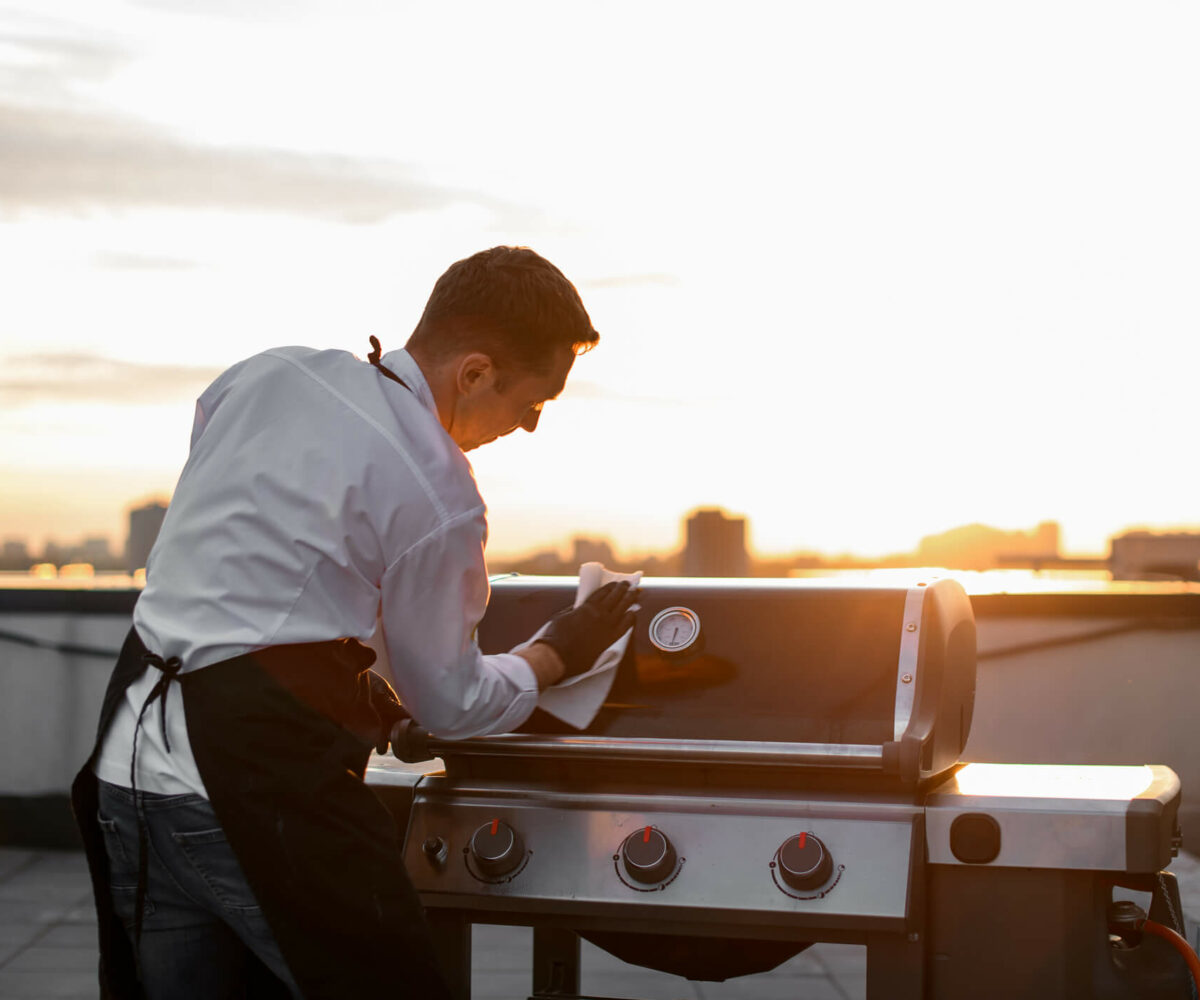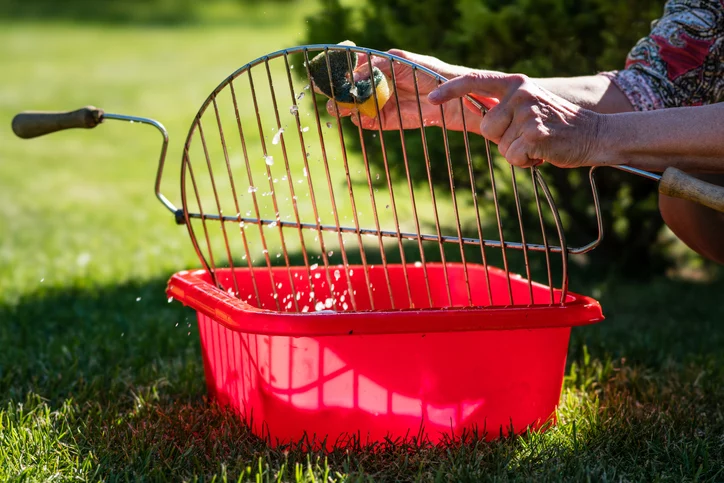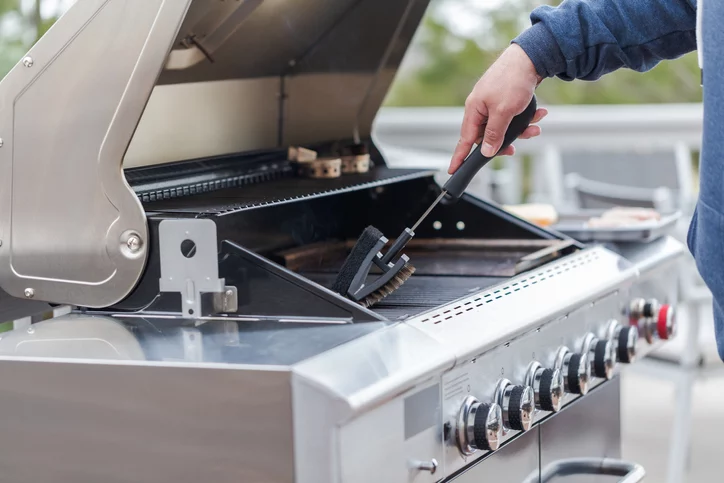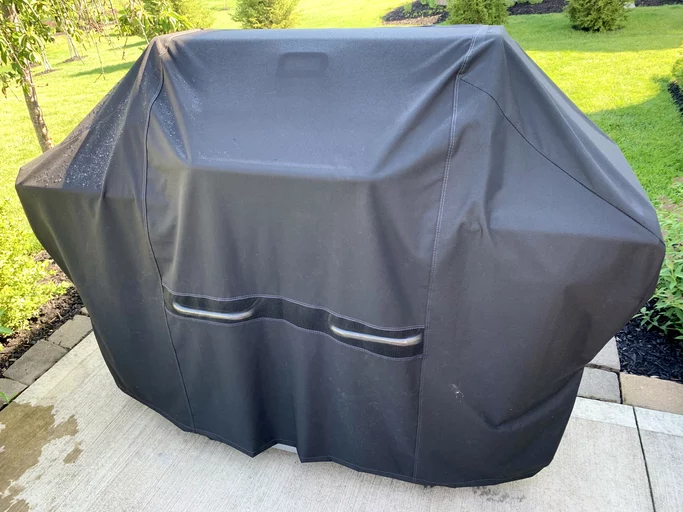5 Tips for Storing Your Grill & Barbecue Equipment
As the grilling season winds down, here are five storage tips to help keep your grill, smoker, and outdoor cooking tools ready for the next season.
A staple of the warm summer months, grilling outside can become unpleasant when the weather turns chilly. Leaving your grill to fend off the elements in the offseason without the proper preparation can lead to extensive damage to the unit. This can compromise the longevity of your favorite cooking device.
To help you avoid the trouble of repairing or replacing your grill sooner than expected, read these tips on how to prep and store your outdoor cooking equipment when the seasons change.
In-season maintenance makes a difference.
When it comes to grill maintenance, the best way to stay ahead is to remain diligent on cleaning your cooking device before and after you use it. Scrubbing your grill or smoker with soap and water from time to time is a must. The frequency of cleaning depends on the type of foods you cook the most.

If you typically cook foods with high amounts of fat, you will want to clean more regularly. A buildup of grease that has dripped onto the burners can cause flare-ups that cook your food unevenly.
Depending on where you live it can be a good idea to use a cover to protect your grill from outside forces when it’s not in use. A heavy-duty, breathable, waterproof cover made of material like polyester will hold up against rain and intense sun exposure. This helps keep your grill in good shape for when you need it.
If you live in an area with high levels of humidity or salty air, however, you should leave your grill uncovered as much as possible. This reduces the amount of salt or moisture that gets trapped underneath the cover. Salt and moisture can cause the grill to rust faster. Unless there is a long period of inclement weather, you will want to keep your grill uncovered. Keep it clean by wiping it down once a week to remove salt deposits and accumulated moisture.
Clean your grill before you cook.
Cleaning your grill before you cook can be a very beneficial practice. Before each cookout, preheat the grill for 15-minutes and brush off the grates with a long-handled stiff-wire brush, carefully wiping down the cleaned area afterwards to remove any bristles that may have broken off during the cleaning process. Doing so will cause any food that was stuck on the grates to turn into ash, making it easier to brush off. Emptying out the drip tray of collected fats before each use should be common practice as well; this reduces the chance of a grease fire.
How to Clean Your Smoker or Flat Top Grill
When cleaning your smoker, a lot of the general maintenance tips that are in place for regular grills also apply. Make sure that you clean the grates before and after each use and wipe off accumulated moisture or salt deposits frequently to ensure that your pellet grill stays fresh when you need it. Remove the chimney cap and clean the inside with a scrub brush and take a wet & dry vacuum in to clear out the ash and debris from the grill’s interior.

While flat top grills are commonly found in commercial settings, some home grills come with this feature as well. Like other grills, start cleaning the surface while it is still hot by spraying a cleaning solution and letting it sit on top for about one minute. Common cleaning solutions include dish soap, a degreaser, or a homemade baking soda mixture. After the minute is up, use a grill brush to scrub away any food debris and wipe it down with a dry cloth. Repeat the process as many times as needed.
Sanitize thoroughly before packing up your grill.
When it’s finally time to pack away the grill or smoker, the first step is to thoroughly clean your cooking device. Soap and water should be used to scrub off the grates and the rest of the inside of the firebox. Gas-powered grills should also have their heat plates and burner tubes cleaned off. The outside of the grill can be wiped down with a multipurpose cleaner to remove dirt and other grime.
Coat the grill grates with a high-heat cooking oil before storing the grill. This protects them from moisture build-up that causes rusting over an extended period of time. Ensure that the grates are completely free of food debris, as putting them away with residue can attract pests looking for a place to nest during the winter or expedite the rusting process.
Winterize your grill.
Once your grill has been properly cleaned, winterize and protect it from any pests that might call it home. The venturi and burner tubes should be wrapped in plastic after cleaning to prevent insects from entering them and building nests. Check underneath all grates, drip pans, control knobs, the grill’s regulator, and other small areas for hiding pests. Don’t forget to use a properly-sized grill cover which will further protect it from unwanted nesting creatures and the elements.
If your grill has any damaged or broken parts, consider replacing them now, so you will be able to get right to cooking when you bring out the grill again. This also ensures that any pre-existing damage to the grill is not made worse by trapped water expanding when it freezes during the winter.
Properly store your grill or smoker.
After you clean and winterize your grill, the last step you need to consider is proper storage. If possible, you will want to store the grill in a cool, dry place that is sheltered from the rain and snow. If it is being stored outside, keeping your cooking device under its protective cover and stowed beneath an overhang is your best bet.

Bringing your grill inside to a shed, garage, outdoor storage closet, or a climate controlled self-storage unit will offer the best protection from critters and inclement weather. If your cooking device is gas-fueled, disconnect the propane tank and tape a plastic bag over the grill line opening to keep spiders and other insects from nesting inside.
How to Store Propane Grills
If your grill is powered by propane, take extra precautions when storing it for the winter. The biggest rule to remember is to never store propane tanks inside, either in your home or an outdoor storage unit or facility. If your propane tank were to leak, a buildup of gas in any enclosed space could be extremely dangerous.
Propane tanks can withstand cold weather, so if you choose to store your grill inside, leave the tank upright and in a sheltered area. If you are keeping your grill outside for the winter you can leave the propane tank connected. Just make sure to completely shut it off and tucked in under the grill’s cover.
Easily store your grill with Advantage Storage.
Grills can take up a lot of space, and sometimes finding a good place to store it at your home isn’t possible. Utilizing a storage unit can be a flexible and affordable solution to this problem, as it keeps your grill in a safe environment out of the elements and away from most intrusive pests. Opting for a climate-controlled unit can reduce the impact that moisture and cold weather has on your grill, and month-to-month leases give you the freedom to use the storage unit only when you need it.
Interested in stowing your grill in a self-storage unit? Advantage Storage is happy to help. Find one of our locations near you to rent your storage unit today!